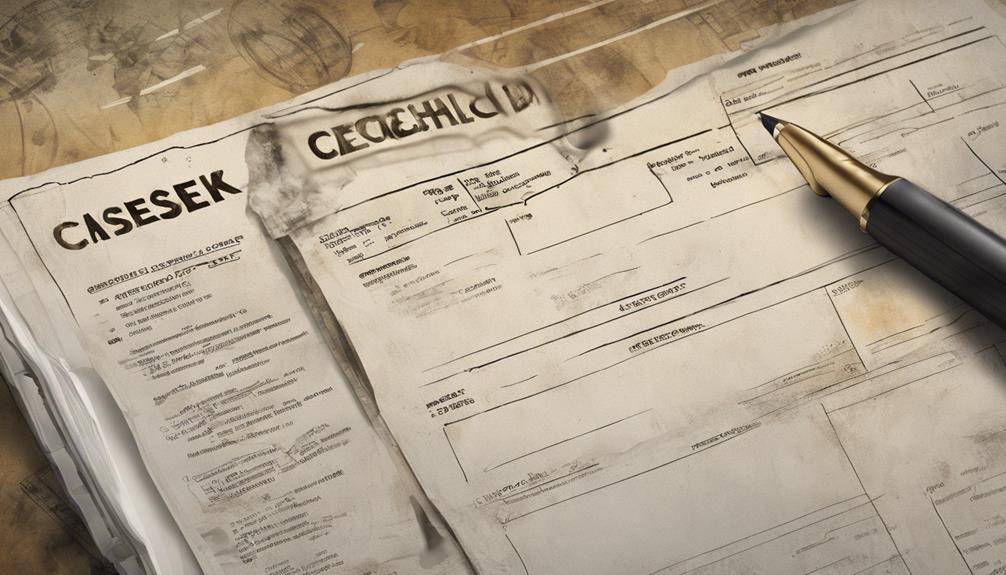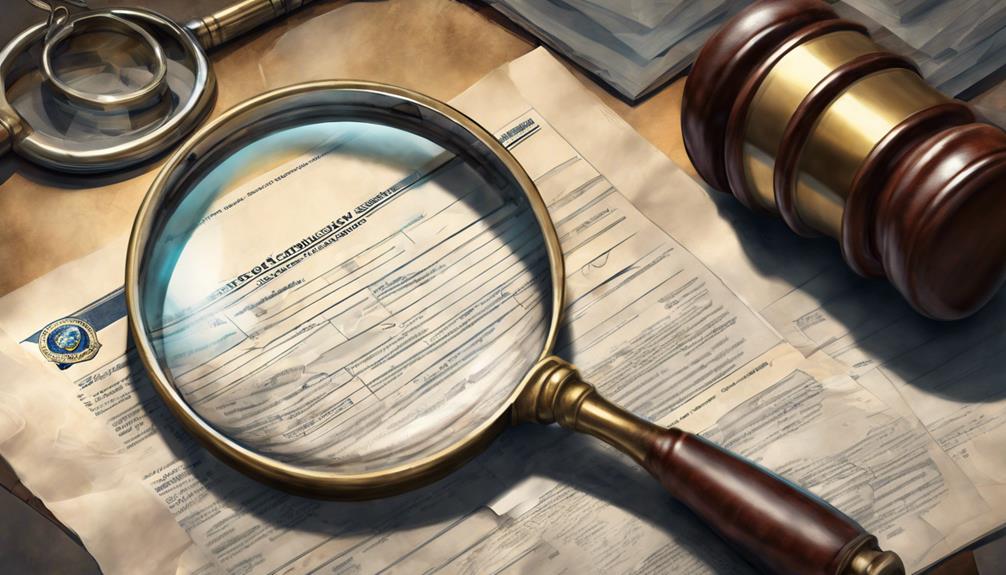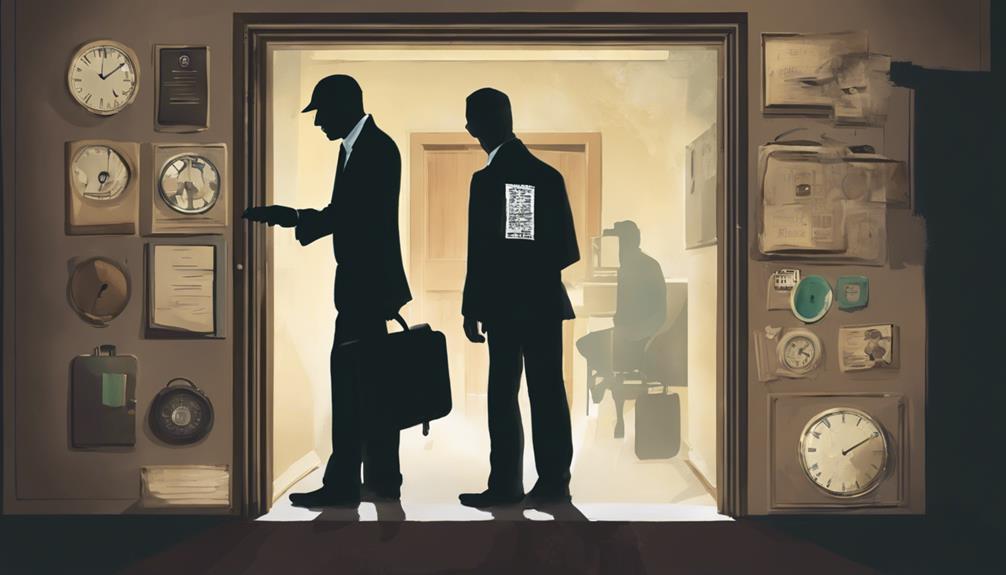Dismissed cases can show on background checks, potentially impacting job opportunities. While expungement can remove these charges from public records, initial background screenings may still reveal them. Arrest records post-dismissal could affect job candidacy. The expunction process is crucial to guarantee a clean record and enhance employability. Transparency regarding dismissed cases during job applications is key. Understanding the legal implications and handling employer considerations can aid individuals with dismissed charges. It's important to address these factors to present a clear background to potential employers.
Key Takeaways
- Dismissed cases can still show on background checks.
- Expungement is needed to remove dismissed cases.
- Expunged cases typically don't appear on background checks.
- Expunction safeguards privacy and reputation from past cases.
- Consulting a criminal defense attorney can aid in the expungement process.
Dismissed Cases on Background Checks

Dismissed cases can still appear on background checks in Texas, potentially impacting individuals seeking employment. Unless properly expunged, these dismissed charges may be visible to employers conducting background screenings. Expungement, a legal process, serves as a vital step in ensuring that dismissed cases are removed from public records.
Once a case is expunged, it typically won't surface on standard background checks commonly used by employers. It is important for individuals with dismissed charges to understand the significance of expungement and seek legal advice on the matter. Consulting with a knowledgeable criminal defense attorney can help navigate the expungement process effectively.
Impact of Dismissed Charges
Dismissed charges can still be visible on background checks, potentially influencing employer decisions.
Employers may take into account the circumstances of the dismissal and the nature of the charges when considering candidates.
Understanding the implications of dismissed charges is essential for individuals handling the job application process.
Dismissed Charges Visibility
When considering the impact of dismissed charges on background checks, it's essential to understand how they can still affect one's opportunities without proper legal action.
Dismissed cases, even though not resulting in a conviction, can still appear on background checks unless they're expunged. In Texas, for example, dismissed cases may show up unless steps are taken to remove them from public records. Expunction is necessary to ensure that dismissed charges don't hinder employment prospects by showing up on background checks visible to potential employers.
Failure to expunge dismissed charges can lead to implications for job opportunities, as employers conducting background checks may still come across these charges. As a result, it's important for individuals to proactively seek expungement of dismissed charges to prevent them from impacting their future employment prospects and overall reputation.
Employer Considerations After Dismissal
Employers often take into account dismissed charges when conducting background checks on potential employees. Even if a case was dismissed, it may still show up on a background check, potentially influencing hiring decisions. Job applicants should be ready to address any dismissed charges during the hiring process to provide context and clarity.
While some states have laws restricting the use of dismissed charges in employment decisions, they can still impact job opportunities. It's vital for individuals to be transparent about their past, including any dismissed cases, to establish trust with potential employers.
Employers evaluating candidates with dismissed cases should consider the circumstances surrounding the charges and the individual's behavior since then. Understanding the nature of the dismissed charges and how the individual has moved forward can provide insight into their character and reliability.
Ultimately, while dismissed cases may not always be disqualifying, they're factors that employers may weigh when making hiring decisions.
Arrest Records Visibility After Dismissal

Even after a case has been dismissed, arrest records may still be visible on background checks conducted by prospective employers. This means that even if charges were ultimately dropped or dismissed, the fact of the arrest itself could still show up during a background check. This visibility can potentially impact a candidate's chances of securing employment, as employers may view the arrest record without the context of the case's dismissal.
It is essential for individuals to be aware of this possibility and take the necessary steps to address it. Expunction, the process of removing dismissed cases from public record, is typically required to make sure that such arrest records don't appear on background checks. Initiating the expunction process through a criminal defense lawyer can be the first step towards clearing one's record and avoiding any negative implications during job applications.
Expunction Process for Dismissed Cases
Expunction is an important legal process that individuals can pursue to remove dismissed cases from their public records. This process is essential as dismissed cases can still appear on background checks, potentially impacting one's opportunities.
Understanding the expunction process and its implications is key to ensuring a clean record and avoiding any negative consequences.
Expunction for Dismissed Cases
The expunction process for dismissed cases involves seeking legal approval for the removal of records from public databases. When a case is dismissed, it can still appear on background checks unless expunged through the legal process.
This entails filing a petition with the court, obtaining approval, and subsequently erasing the arrest record associated with the dismissed case. Once expunged, the dismissed case will typically not show up on most background checks conducted for employment purposes, providing individuals with a clean slate for better job prospects.
Expunction plays a pivotal role in helping individuals clear their records of dismissed cases, ensuring that past legal issues don't hinder their future opportunities. By going through the expunction process, individuals can effectively remove dismissed cases from public visibility, allowing them to move forward without the burden of past legal matters affecting their background checks.
Impact on Background Checks
Having dismissed cases expunged greatly impacts background checks by guaranteeing that past legal matters don't hinder individuals' future opportunities.
When a dismissed case is expunged, it's effectively erased from public record, meaning that it won't appear on standard background checks conducted by employers or other entities. This process is essential for individuals seeking employment or housing, as it allows them to move forward without the stigma of past legal issues.
Expungement not only removes dismissed cases from background checks but also prohibits job applications from inquiring about these cases. This legal protection guarantees that individuals aren't unfairly discriminated against based on past accusations that didn't lead to convictions.
Additionally, expunction can involve the deletion, redaction, or destruction of associated arrest records, further safeguarding individuals' privacy and reputation in the eyes of potential employers or landlords.
Legal Implications Explained
When seeking to clear dismissed cases from public record, individuals must navigate the legal process of expungement in Texas. Expunction is an essential step in ensuring that past dismissed cases don't show up on background checks, providing a clean slate for individuals seeking employment or other opportunities.
Here are four key points to understand about the expunction process for dismissed cases:
- Legal Requirement: Expunction is the legal process specifically designed to remove dismissed cases from public record, ensuring that individuals aren't unfairly impacted by past arrests.
- Petition Filing: To initiate the expunction process, individuals typically need to file a petition with the assistance of a criminal defense lawyer who can guide them through the necessary steps.
- Judicial Approval: Expunction requires obtaining a judge's approval, highlighting the formal legal procedure involved in clearing dismissed cases from public databases.
- Clean Slate: Once the expunction is granted, individuals can legally deny any past arrests that have been expunged, presenting a clean slate on background checks and job applications.
Job Application Considerations

Job applicants should take into account how dismissed cases can impact their job applications. When it comes to background checks, dismissed cases can still appear unless they've been legally expunged or sealed.
Employers conducting background screenings may come across these dismissed cases, potentially affecting the hiring decision. It's essential for job seekers to understand that they may need to disclose dismissed cases if questioned during the application process or interviews.
Taking the necessary steps to expunge a dismissed case can help job applicants present a cleaner record to potential employers, reducing any negative implications that could arise. By being transparent about dismissed cases and proactively addressing them, job seekers can demonstrate honesty and responsibility, which are valued traits in the hiring process.
Job applicants should be mindful of how dismissed cases can impact their job applications and consider taking appropriate actions to address them beforehand.
FCRA Guidelines on Dismissed Charges
Most employers must conform to FCRA guidelines that dictate how dismissed charges without convictions should be handled in background checks. According to these guidelines:
- Dismissed charges that didn't result in a conviction shouldn't be included in background checks conducted by most employers.
- Such cases are typically not considered part of a candidate's criminal history in these checks.
- FCRA regulations specifically prohibit the reporting of dismissed charges that didn't lead to a conviction.
- The primary goal of these guidelines is to safeguard job applicants from facing unfair treatment based on dismissed charges that didn't result in a conviction.
Job seekers can rely on FCRA guidelines to make certain that dismissed cases without convictions shouldn't have a negative impact on their background checks. By strictly adhering to these rules, employers can maintain fairness and accuracy in their hiring processes, giving candidates a fair chance at employment opportunities.
Ban the Box Laws Overview

Ban the Box laws, designed to restrict early inquiries about an applicant's criminal past, play an essential role in promoting fair hiring practices.
By delaying the discussion of criminal history until later in the hiring process, these laws offer individuals with dismissed cases or non-convictions a better chance at securing employment opportunities.
The impact of Ban the Box laws on hiring practices can vary depending on the jurisdiction's specific regulations and enforcement mechanisms.
Ban the Box Purpose
How do Ban the Box laws impact the initial stages of the hiring process for employers in jurisdictions where they're implemented?
Ban the Box laws serve an essential purpose in shaping the hiring process and promoting fair practices.
- Removal of Criminal History Inquiry:
Ban the Box laws eliminate the checkbox on job applications that inquire about an applicant's criminal history, allowing individuals to be considered based on their qualifications first.
- Prevention of Automatic Disqualification:
These laws help prevent employers from automatically disqualifying candidates with dismissed cases or past criminal records, giving them a fair chance at securing employment.
- Promotion of Fair Hiring:
By delaying the inquiry about criminal history until later in the hiring process, Ban the Box laws promote fair hiring practices and guarantee that individuals aren't unfairly discriminated against based on their past.
- Reduction of Discrimination:
Implemented in various states and cities across the United States, Ban the Box laws aim to reduce discrimination based on criminal history and provide individuals with a better opportunity to reintegrate into the workforce.
Implementation Details
Employers in jurisdictions where Ban the Box laws are in effect are required to adjust their hiring processes to comply with regulations limiting inquiries into applicants' criminal histories.
Specifically, when it comes to individuals with dismissed cases, Ban the Box laws play an important role by delaying questions about criminal convictions until later stages of the hiring process.
These laws, implemented in certain states and cities, are designed to promote fair hiring practices and provide equal opportunities for all applicants.
Under Ban the Box laws, inquiries regarding dismissed cases may be restricted to certain job positions or industries, guaranteeing that individuals with past legal issues aren't unfairly discriminated against during the initial stages of the application process.
Understanding the nuances of Ban the Box laws is vital for both employers and job seekers, particularly those with dismissed cases, as it can help navigate the hiring process more effectively and make sure compliance with relevant regulations.
Impact on Hiring
The implementation of Ban the Box laws in certain jurisdictions has greatly reshaped the initial stages of the hiring process by delaying inquiries into applicants' criminal history. This delay has a significant impact on hiring practices, especially for individuals with dismissed cases.
Here are four key ways Ban the Box laws affect the hiring process:
- Increased Fairness: Ban the Box laws promote fairness by allowing individuals with dismissed cases to be considered based on their qualifications before their criminal history is revealed.
- Reduced Discrimination: These laws help prevent discrimination against individuals with dismissed cases, ensuring they aren't immediately excluded from job opportunities.
- Equal Employment Opportunities: Ban the Box laws promote equal employment opportunities for all applicants, regardless of their past legal encounters.
- Compliance Requirements: Employers must adhere to Ban the Box laws to create a fair and unbiased hiring process, benefiting individuals with dismissed cases seeking employment.
Handling Questions From Employers
When questioned by potential employers about dismissed cases on background checks, job applicants should be prepared to provide honest and transparent explanations. Being upfront about the circumstances surrounding a dismissed case can demonstrate integrity and responsibility. It is essential for applicants to understand that dismissed cases may still appear on background checks unless legally expunged or sealed. Here is a helpful table to guide individuals on how to handle questions from employers regarding dismissed cases:
| Handling Questions From Employers | Tips |
|---|---|
| Be Honest and Transparent | Provide a clear and truthful explanation |
| Seek Legal Advice | Understand your rights and legal options |
| Focus on Personal Growth | Emphasize what you have learned from the experience |
Legal Actions for Discrimination

In situations where discrimination based on dismissed cases arises, individuals have the option to take legal action to protect their rights and seek justice. When facing discriminatory practices related to dismissed cases on background checks, individuals can pursue the following courses of action:
- File a claim with the EEOC: If discrimination based on dismissed cases occurs during the hiring process, individuals can seek assistance from the Equal Employment Opportunity Commission (EEOC) to address the issue.
- Take legal action against employers: Individuals have the right to take legal action against employers who engage in discriminatory practices related to dismissed cases appearing on background checks.
- Leverage Title VII protections: Title VII of the Civil Rights Act offers protection against employment discrimination, including situations involving dismissed cases.
- Hold employers accountable under federal laws: Federal laws provide avenues for holding employers accountable for discriminatory actions related to dismissed cases, ensuring fair treatment in the hiring process.
Criminal History Influence on Employment
Dismissed cases on background checks can significantly impact an individual's employment opportunities. When employers conduct criminal history background checks in Texas, dismissed cases may still show up unless expunged.
For employers, seeing dismissed cases as part of a background check could raise concerns about the applicant's past involvement with the legal system. Please note that simply dismissing a case doesn't automatically clear it from background checks. To remove dismissed cases from public record and improve chances of employment, individuals must pursue expungement.
Understanding expungement laws in Texas is essential for managing dismissed cases on background checks effectively. By taking the necessary steps to expunge dismissed cases, individuals can enhance their prospects in the job market and mitigate potential negative perceptions associated with a criminal history background check.
Frequently Asked Questions
What Does a Background Check Show in Texas?
A background check in Texas can reveal various information about an individual, including criminal records, employment history, and credit reports. Employers often rely on these checks to assess a candidate's suitability for a job.
Will Pending Charges Show up on a Background Check in Texas?
Pending charges in Texas may show up on background checks. This can impact legal and employment matters. Active warrants, whether related to pending charges or other legal issues, are typically visible, signifying unresolved legal matters.
How to Get a Dismissed Case Expunged in Texas?
To get a dismissed case expunged in Texas, an individual must file a petition for expunction through a criminal defense lawyer. This process requires a judge's approval to remove the case from public record, allowing for a clean background check.
Does Deferred Adjudication Show up on a Background Check in Texas?
Diving into the depths of background checks in Texas, deferred adjudication can emerge as a shadow of past legal entanglements. While not a conviction, its presence can still cast a cloud over employment prospects.
Do Pending Cases Have the Same Impact on Background Checks as Dismissed Cases?
Pending cases on background checks can have a similar impact as dismissed cases. Employers may still see them and make assumptions about your criminal history, potentially affecting job prospects. It’s important to provide context and clarification if necessary, to ensure a fair assessment of your background.
Conclusion
To sum up, while dismissed cases may not always show up on background checks, they can still have an impact on job opportunities.
It's important for individuals to be aware of their rights regarding dismissed charges, expunction processes, and potential discrimination in the hiring process.
By understanding the implications of dismissed cases, individuals can navigate job applications and interviews with confidence and knowledge.








